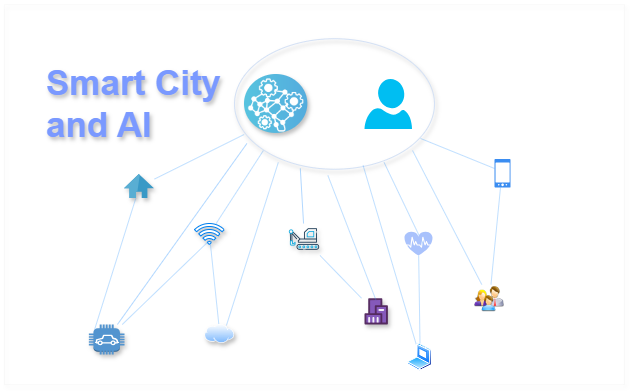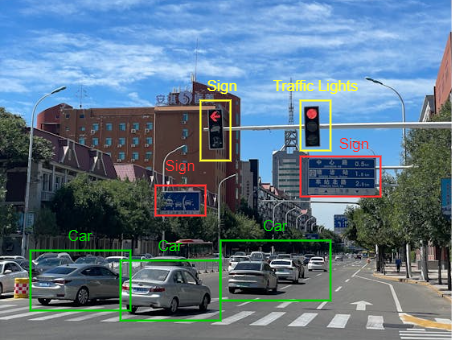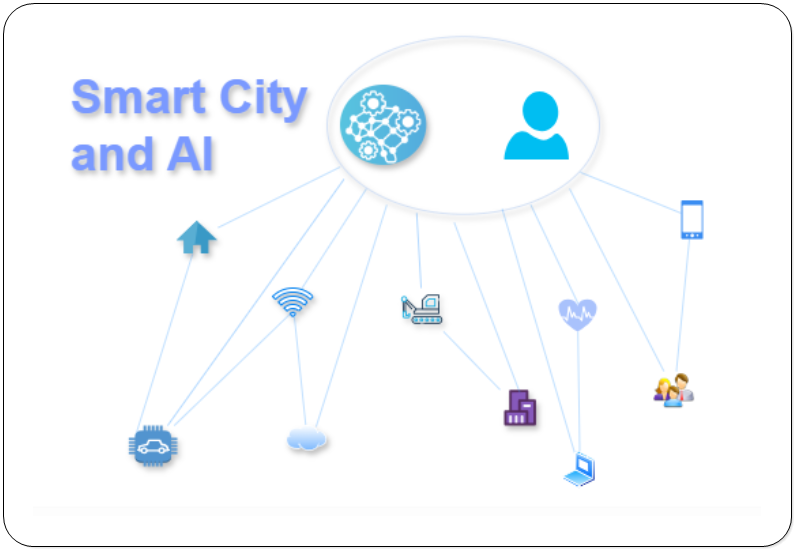HOW DOES AI MAKE CITIES SMART?
The development of computer systems that can carry out tasks like speech recognition, natural language processing, and visual perception is known as artificial intelligence (AI). Without explicit programming, it learns and executes tasks using machine learning, deep learning, and natural language processing approaches. AI provides several advantages, including enhanced decision-making across a range of businesses and higher efficiency and accuracy. Additionally, by offering new instruments for the analysis, modeling, and simulation of urban processes, it has the potential to revolutionize urban planning and build “smart cities”.
Smart city
The demand for smart city solutions to raise city inhabitants’ quality of life is increasing due to urban migration. But the infrastructures that are in place now are either inadequate or antiquated to fulfill the needs of the expanding population. The government needs to make use of contemporary technologies to make urban residents’ lives easier and better while also guaranteeing a more sustainable and safe environment.
A smart city is a system that solves challenging urban issues and tackles financial, social, and environmental obstacles with the use of creativity and technologies. It seeks to build livable, resilient, and sustainable places that promote vibrant communities and encourage involvement and inclusiveness. This comprehensive approach necessitates innovative ways of thinking and addressing problems.
Explore the role of AI in smart urban development?

Because AI offers new methods for modeling and analyzing intricate urban processes, it has the potential to completely transform the field of urban planning. Conventional planning produces inefficiencies and less-than-ideal decisions since it is based on static models and sparse data. Artificial intelligence (AI) has the potential to make urban planning a dynamic, data-driven, and citizen-focused process. Massive volumes of data are gathered and processed by AI systems from a variety of sources, such as social media, IoT devices, sensors, and public records. This data covers a wide range of urban living topics, including public safety, trash management, energy use, transportation, and citizen behavior. Artificial Intelligence (AI) can uncover patterns, trends, and obstacles by combining and evaluating this data to offer insightful information about how the city operates. AI is also capable of making suggestions, optimizing the use of resources, identifying inefficiencies, and coming up with solutions. AI may also improve citizen experiences by providing tailored suggestions for restaurants, tasks, and events, which will increase citizen pleasure and involvement.
Large volumes of data from several sources may be handled by artificial intelligence in an efficient manner, improving local operations’ effectiveness and efficacy while cutting expenses. By gathering and evaluating data from several municipal services, this technology can assist in addressing insufficient utilization, excessive use, and inefficiency in public infrastructure, ultimately improving the general efficiency of urban operations.
“Smart cities” are able to tackle a wide range of issues, including traffic and criminal activity, because of the integration of artificial intelligence (AI) and analytics using sensor data from all across the city.
- The citizen-centered programmed can benefit from AI.
- The public may provide feedback on it.
- AI has the ability to utilize existing resources efficiently.

Applications of AI in Smart Cities
- Transportation and Artificial Intelligence in Smart Cities
-
-
- Sensor systems and AI-driven traffic signaling can assist prevent gridlock.
- Real-time density of vehicles data is collected by AI-powered traffic recording devices, which enables modifications to traffic control.
- AI can lower driving stress, resulting in fuel savings and a reduction in the number of staff required.
-
- AI-Powered Energy Optimization in Smart Cities
-
-
- AI is able to monitor and assess energy use in smart cities, which helps to decide where to locate renewable energy producing facilities.
- Municipal planners are able to pinpoint high-energy-waste regions and put conservation measures in place.
-
- AI in Smart Cities and Public Safety
-
-
- Artificial Intelligence (AI) has the potential to improve public safety and fight crimes. It can help authorities find stolen vehicles and compare information with criminal databases.
- Up to 1,800 license plates may be scanned every minute by automated license plate readers (LPRs) in four lanes of traffic.
-
- Sustainable Development and Artificial Intelligence in Smart Cities
-
-
- Artificial intelligence (AI) can detect CO2, which helps with transportation decisions.
- AI can help regulate pollution and identify the optimal usage of energy.
-
- Computer Vision in Construction
-
- In smart cities, artificial intelligence may be used to check compliance.
- Time-saving and more accurate computer vision techniques.
- It’s crucial to monitor compliance to spot situations when workers aren’t wearing enough protective gear or when violations of standards are happening on a regular basis.
Conclusion
Smart City technology has the ability to drastically change city life by improving productivity, efficiency, safety, and economic rewards through the use of computer vision and artificial intelligence.
